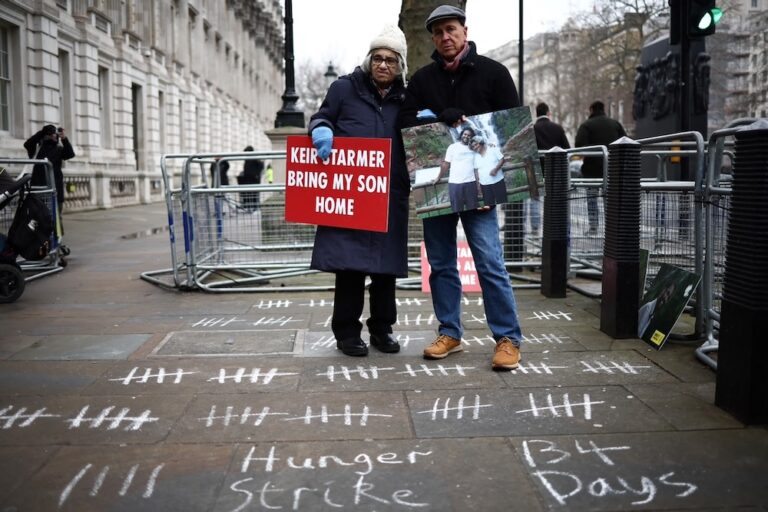PEN International calls for all charges against Lina Attalah to be dropped and for an end to the crackdown on press freedom.
This statement was originally published on pen-international.org on 21 February 2024.
PEN International condemns the Egyptian authorities’ decision to revive a retaliatory investigation against independent news service Mada Masr, questioning its Editor-in-Chief, Lina Attalah, on charges of “publishing false news” and “managing a website without a license” in relation to the news outlet’s reporting on Israel’s offensive in Gaza. Sustained attacks against Egypt’s few remaining independent journalists amid an increasingly censored media landscape indicate President Al-Sisi’s relentless efforts to begin his third term by eradicating press freedom.
Journalists should never be subject to intimidation or judicial harassment because of their work. PEN International calls for all charges against Lina Attalah to be dropped and for an end to the crackdown on press freedom in Egypt.
On 20 February, the Cairo Appeals Prosecution released Attalah on bail of EGP 5000 after she was questioned on charges of “publishing false news” and “managing a website without a license”. The charges stem from the website’s coverage of Israel’s offensive in Gaza in October 2023. On 13 February, independent news service Mada Masr published an investigation into a corruption scandal around the role of businessman Ibrahim al-Argany, who is known for his close connections to President Al-Sisi, in profiting from the movement of people and goods on the Rafah border crossing between Egypt and the Gaza Strip during the ongoing humanitarian catastrophe in Gaza. Just days after the investigation was published, Mada Masr announced that its editor-in-chief, Lina Attalah, one of TIME’s most influential people in 2020, was summoned for questioning by the public prosecution.
The summons order concerns an investigation that was originally opened on 15 October 2023 following a complaint submitted by Egypt’s media regulator regarding a report published by Mada Masr in October 2023 on the displacement of Palestinians from Gaza to Egypt as a result of Israel’s offensive in Gaza. Following the 2023 report, the Supreme Media Regulatory Council (SMRC) decided to block Mada Masr’s website for six months and referred its editor-in-chief, Lina Attalah, to the public prosecutor, citing harm to national security. Attalah was due to be investigated in December 2023, but the public prosecutor then postponed the investigation indefinitely. In February 2024, the Egyptian authorities revived the 2023 investigation in an apparent act of retaliation against Mada Masr’s ongoing journalistic work.
Background
Since President Al-Sisi grabbed power in 2014, spaces for independent and free media have shrunk significantly. Egyptian authorities have utilised a series of draconian laws, including the notorious 2015 counter-terrorism law along with other repressive tactics, to erode freedom of expression and impose suffocating restrictions on media outlets and critical voices. Since 2017 Al-Sisi has been aggressively consolidating his grip over traditional media outlets, redesigning the legislative framework governing the media and redrawing the ownership structure of the private media outlets. In January 2017, a former military intelligence officer and former army spokesperson announced that his company had officially taken over the Al-Assema private media network. Additionally, the DMC TV network, which is widely known to be controlled by the military, started broadcasting in 2017, establishing itself as a major player in the Arab media landscape. In September 2017, a subsidiary of the Falcon Group, an Egyptian security agency connected to high-ranking government officials, purchased the private al-Hayat media network. Most of Egypt’s traditional media outlets are now controlled or heavily influenced by the country’s security agencies.
Mada Masr is one of the few remaining independent media outlets that is not controlled or influenced by Egyptian security agencies. Since its establishment in 2013, Mada Masr’s journalists have been offering their readers high-quality journalism, including news and investigative reports on politics, human rights abuses, and corruption. Egyptian authorities have repeatedly harassed Mada Masr and its journalists because of their reporting. In November 2019, Mada Masr’s office in Cairo was raided by security agents who detained three senior journalists for hours, just days after Mada Masr published a story about President Al-Sisi’s son. In May 2020, Lina Attalah, Mada Masr’s editor-in-chief, was arrested and detained for several hours while interviewing Laila Soueif, the mother of imprisoned British-Egyptian writer Alaa Abdel Fattah. In August 2022, Egyptian prosecutors summoned Attalah, and journalists Rana Mamdouh, Sara Seif Eddin and Beesan Kassab for interrogation in relation to their reporting, which revealed plans to sack several senior officials in the pro-government Nation’s Future Party due to their alleged involvement in instances of corruption.
Ahead of the 2023 presidential elections, Egyptian authorities escalated their crackdown on freedom of expression and freedom of the press, charging opposition figures with defamation, arresting independent journalists, and arbitrarily detaining the family members of exiled journalists and activists to silence them. The crackdown took place amid preparations for the presidential elections, the fairness of which has been questioned by Egyptian human rights groups, who have raised concerns over the al-Sisi administration’s efforts to enforce a climate of fear through unrelenting repression. In August, Egyptian publisher and opposition figure Hisham Kassem was detained and later sentenced to six months in prison on defamation charges in relation to his critical views of a former government minister. Before his detention and subsequent conviction, Kassem harshly criticised President Al-Sisi and his failure to address the country’s dire political and economic situation. Also, in August, Gamal Abdel Hamid, the father of exiled journalist Ahmed Gamal Ziada, editor-in-chief of Zawia3 (Third Angle), was detained for weeks in retaliation for his son’s journalistic work around the county’s appalling human rights record and the political scene ahead of the December election.



